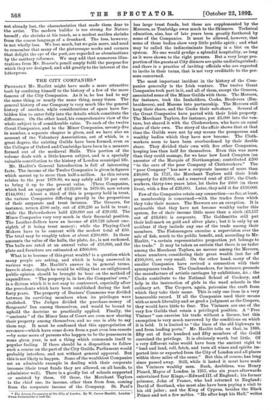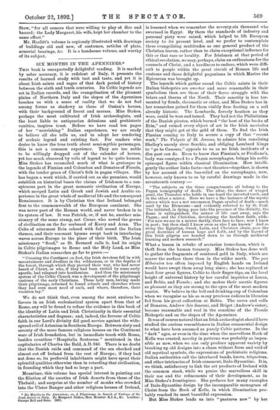THE CITY COMPANIES.* PROBABLY Mr. Hazlitt might have made a
more attractive book by confining himself to the history of a few of the more famous of the City Companies. As it is, be has had to say the same thing, or nearly the same thing, many times. The general history of one Company is very much like the general history of another, while considerations of space have for- bidden him to enter fully into the details which constitute the difference. On the other hand, his comprehensive view of the whole subject is of considerable value. To each of the twelve Great Companies, and to the Minor Companies, seventy-five in number, a separate chapter is given, and we have also an account of the Voluntary Associations, out of which, in a great degree, the existing Guilds have been formed, even as the Colleges of Oxford and Cambridge have been in a measure formed out of the media3val Halls. This portion of the volume deals with a little-known subject, and is a specially valuable contribution to the history of London municipal life.
Mr. Hazlitt's General Introduction is full of interesting facts. The income of the Twelve Companies is given in figures which mount up to more than half-a-million. As this return relates to the year 1879-80, we may safely add 10 per cent. to bring it up to the present value. (Three Companies, which had an aggregate of £123,000 in 1879-80, now return 2144,000.) About a third of this is property held in trust, the various Companies differing greatly in the proportions of their corporate and trust incomes. The Grocers, for instance, return £500 only, out of 238,236 as held in trust ; while the Haberdashers hold £20,000 out of £29,032. The Minor Companies vary very much in their financial position. The Leather-Sellers have an income of £18,728 (about one- eighth of it being trust money) ; while the Playing-Card Makers have to be content with the modest total of £50. The total may be roughly taken at about £200,000. In these amounts the value of the halls, the plate, &c., is not reckoned. The halls are rated at an annual value of £55,000, and the plate and furniture are estimated at £300,000.
What is to become of this great wealth? is a question which many people are asking, and which is being answered in various ways. Mr. Hazlitt's answer is, in general terms, leave it alone ; though he would be willing that an enlightened public opinion should be brought to bear on the method of expenditure. " The property is, in law, the Companies' own," is a dictum which it is not easy to controvert, especially after the precedents which have been established during the last forty years. The property of Doctors' Commons was divided between its surviving members when its privileges were abolished. The Judges divided the purchase-money of Sergeants' Inn among themselves, and would be bound to uphold the doctrine so practically applied. Finally, the " ancients " of the Minor Inns of Court are even now sharing their property among themselves, and no one is able to say them nay. It must be confessed that this appropriation of revenues—which have come down from a past even less remote —by some score of persons who happen to be the possessors in some given year, is not a thing which commends itself to popular feeling. If there should be a disposition to follow such a course on the part of the City Guilds, Parliament would probably interfere, and not without general approval. But this is not likely to happen. Some of the wealthiest Companies set an admirable example in dealing with their corporate incomes (their trust funds they are allowed, on all hands, to administer well). There is a goodly list of schools supported or assisted by them. Of these, the Merchant Taylors is the chief one, its income, other than from fees, coming from the corporate income of the Company. St. Paul's
• The Livery Companies of the City of London. By W. Carew Hazlitt. London Swan Ponnensokeln and Co.
has large trust funds, but these are supplemented by the Mercers, as Tonbridge owes much to the Skinners. Technical education, also, has of late years been greatly furthered by some of the Companies. It must be allowed, however, that some of these bodies show very little public spirit ; and what may be called the indiscriminate feasting is a blot on the system. No one would grudge a splendid hospitality, as long as it were shown to the right persons. But a very large pro- portion of the guests at City dinners are quite undistinguished ; and there is a practice of inviting officials who are expected to invite in their turns, that is not very creditable to the per- sons concerned.
The most important incident in the history of the Com- panies generally is the Irish venture. The twelve Great Companies took part in it, and all of them, except the Grocers, associated some of the Minor Guilds with them. The Mercers, for instance, took the Innholders, Cooks, Broderers (Em- broiderers), and Masons into partnership. The Mercers still keep their share, and the Cooks their sub-share. Several of the Great Companies have parted with their Irish property. The Merchant Taylors, for instance, put £5,000 into the ven- ture, but shared it with the Clothworkers, who have an equal share of their own. The story of the affair shows that at that time the Guilds were not by any means the prosperous and wealthy bodies which they have now become. The Cloth- workers seem to have been overburdened by their double share. They divided their own with five other Companies, keeping less than half for themselves. Even this was more than they could manage, for we hear how Lord Compton (an ancestor of the Marquis of Northampton) contributed £200 "to the care of the poor Company of Clothworkers." The "poor Company" has now a corporate income of more than £40,000. In 1727, the Merchant Taylors sold their Irish property for £20,000, and a reserved rent of £150; the Cloth- workers, thirty-two years later, let theirs for £600 (in three lives), with a fine of 228,000. Later, they sold it for £150,000.
Few of the Companies retain any connection—as far, at least, as membership is concerned—with the trades from which they take their names. The Brewers are an exception. It is noticeable that they have not become wealthy under this system, for of their income little more than a sixth (£3,157 out of £18,640) is corporate. The Goldsmiths still put their hall-mark on gold and silver plate ; but it is only by an accident if they include any one of the trade among their members. The Fishmongers exercise a supervision over the sale of fish, much to the public benefit, and, according to Mr. Hazlitt, "a certain representative proportion yet belongs to the trade." It may be taken as certain that there is no tailor among the Merchant Taylors, no mercer among the Mercers, whose numbers, considering their great wealth (not far off 400,000), are very small. On the other hand, many of the smaller Companies have revived a connection with their synonymous trades. The Coachmakers, for instance, promote the manufacture of artistic carriages by exhibitions, &c. ; the Cooks contribute to the National School of Cookery, and help in the instruction of girls in the ward schools in the culinary art. The Coopers, again, patronise the craft from which they take their name. This is only one item in a very honourable record. If all the Companies used their means with as much liberality and as good a judgment as the Coopers, they would have little to fear. The Vintners are one of the very few Guilds that retain a privileged position. A "Free Vintner" can exercise his trade without a licence, but this exemption is very much narrowed by the conditions on which it is held. It is limited to "the lines of the old highways to and from leading ports." Mr. Hazlitt tells us that, in 1888, fifty out of four hundred and fifty members of the Guild exercised the privilege. It is obviously worth but little. Of a very different value would have been the ancient right to "load and land, roll, fetch, and turn all wines and spirits im- ported into or exported from the City of London and all places within three miles of the same." But this, of course, has long since passed away. Still, while it lasted it must have made the Vintners wealthy men. Such, doubtless, was Henry Picard, Mayor of London in 1357, who six years afterwards entertained four Kings,—Edward III. of England ; his former prisoner, John of France, who had returned to England ; David of Scotland, who must also have been paying a visit to his old jailor; and the King of Cyprus, besides the Black Prince and not a few nobles. "He after kept his Hall," writes Stow, "for all comers that were willing to play at dice and hazard; the Lady Margaret, his wife, kept her chamber to the same effect."
Mr. Hazlitt's volume is copiously illustrated with drawings of buildings old and new, of costumes, articles of plate, armorial bearings, &c. It is a handsome volume, and worthy of its subject.







































 Previous page
Previous page